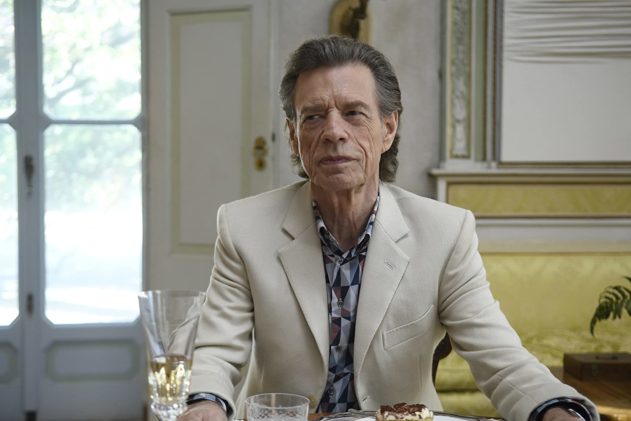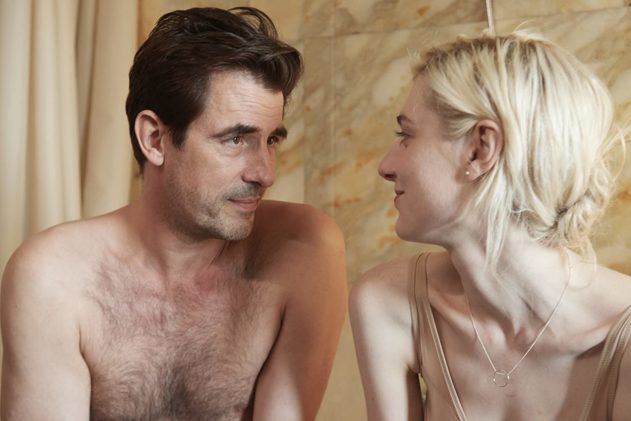Mick Jagger as art dealer and Claes Bang (“The Square”) as artist team up in “The Burnt Orange Heresy” (review)
It’s a strange time for all of us, and perhaps it’s little wonder that the crop of films being released direct to streaming has itself gotten weird. How else to explain a movie where Mick Jagger plays an arts dealer who may, and this is giving nothing away, actually be the devil in disguise? (in case you don’t guess his name, it is Joseph Cassidy. As Al Pacino observed as Satan in “The Devil’s Advocate, “I have so many names.”).
But before the ever-craggier great-grandfather and Rolling Stones frontman comes into frame in “The Burnt Orange Heresy,” first we must meet James Figueras (Claes Bang), a frustrated artist who now toils in academia. At one such lecture, the cynical yet attractive James catches the eye of young Berenice Hollis (Elizabeth Debicki). The two share conversation and, rather briskly, their bed. But there is more to James than at first Berenice recognizes.
Against better judgment—though such is required in thrillers—Berenice agrees to accompany James to the Lake Como villa of the charismatic art dealer Cassidy (Jagger, absolutely chewing up the scenery). Like all devilish figures, Cassidy requests of James a singular mission whose price is no less than his soul: Steal a painting from the reclusive Jerome Debney (Donald Sutherland, tragically underused here).
Is this for the good of the art world, since Debney has kept his work to himself, or is Cassidy simply greedy? No matter: The point, as in all soul-destroying enterprises, is to tempt James into committing horrible acts. Which he will do—and how.
“The Burnt Orange Heresy” had its world premiere at the 76th Venice International Film Festival in September 2019. Sony Pictures Classics acquired distribution rights to the film following this.
It’s at this point that discretion dictates I stop discussing the plot and leave the ensuing for the reader to discover. The script by Scott B. Smith (of the far superior “A Simple Plan,” and based on a novel by Charles Willeford) begins as a character study, a tête-à-tête not between good and evil but between ambition and righteousness. Might stealing the Debney at last give the mediocre James some of the recognition that has long eluded him in the art world? If the film had kept on this tack, it could have danced with issues of morality and duality and made us think. But no, instead director Giuseppe Capotondi heads straight into noir land, and before long what had heretofore been set up as a caper descends into arson and murder.
A key character’s actions toward the end of the film are unearned. Nothing that has come before alerts us that he, or she, is capable of what transpires in the last act, and when the violence at last erupts, it is drawn out and exploitative. Even if it follows along with whatever happens in the book, that doesn’t excuse pulling a complete one-eighty with a main character. For descents into madness and evil are always gradual, never sudden. Theft doesn’t necessarily lead to murder.
Ah, but thankfully we have Jagger to watch—though his scenes are few, that mile-wide grin that has served him well for nearly six decades in the public eye here takes on a sinister term as the tempter. And the French-born actress Debicki, known this side of the Atlantic largely for the “Guardians of the Galaxy” series, shows poise and adds some gravity to a largely-underwritten character, especially in a key scene at the climax point.
The screenwriter and novelist Smith knows his way around noir, as anyone who has seen “A Simple Plan” can attest. But in that film from 1998 (superbly directed by Sam Raimi), the characters’ fall from decent working people to thieves and killers was both gradual and expertly rendered, and came about only when the opportunity to steal a huge sum of money was introduced. By contrast, “The Burnt Orange Heresy” would have you believe that people are capable of the most heinous acts over … a painting.
I don’t know. Maybe I missed something. Or, I’m getting too cranky. The film is perfectly competent and well-made, especially in its location work around Lake Como, but it leaves us with little to ponder about our own morality and the fragility of decency and humanity. My advice: Use the shutdown to run “A Simple Plan” again.
Available for streaming beginning today.
news via inbox
Nulla turp dis cursus. Integer liberos euismod pretium faucibua




